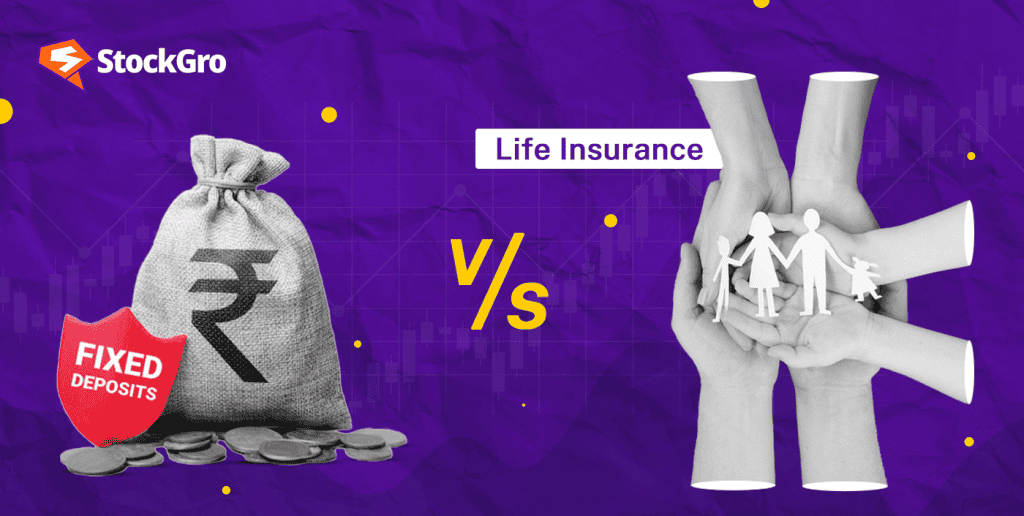
When planning financial affairs, selecting the appropriate product is vital for security and savings. Life insurance and fixed deposits (FDs) are two often used choices with different financial purposes.
A fixed deposit is a safe investment whereby your money is parked for a predetermined time with assured returns. Conversely, frequently with a savings or investment component, life insurance offers financial protection to your loved ones should a premature death occur.
This article will explore the difference between FD and life insurance, comparing their features, benefits, and suitability for different financial needs. Whether you’re looking for a life insurance fixed deposit combination or seeking clarity on which option aligns with your savings and protection goals, this article will help you make an informed choice.
Understanding fixed deposits
Among the most often used and safe investing choices available in India are fixed deposits. It entails making a lump sum payment at a set interest rate to a bank or other financial institution for a set duration. For individuals who wish to increase their money without running across market hazards, this presents assured returns, which attracts them.
For instance, you can figure exactly how much you will get at maturity if you invest ₹1,00,000 in an FD for two years at an interest rate of 7%. For risk-averse consumers who value consistency in their investments, fixed deposits especially appeal.
Furthermore, while FDs provide liquidity following the lock-in period, early withdrawals could result in penalties or lower interest income. This keeps simple access to your money after the tenure expires and makes it a good choice for short-to-medium-term objectives like saving for a vacation or a down payment on a car.
Also read: Fixed Deposits with Monthly Interest Payouts
Understanding life insurance
One financial tool meant to offer a safety net for your loved ones should be life insurance should something happen to you. If you are the main income in your family, for example, a life insurance policy guarantees that your dependents get a lump sum payment upon your death, thus enabling financial management.
Some life insurance policies include an investment component beyond mere protection. Endowment plans give assured returns at the conclusion of the policy period; plans like Unit-Linked Insurance Plans (ULIPs) let you invest in market-linked securities.
There are several kinds of life insurance to fit different purposes:
- Term plans: Provide pure life cover without returns unless a claim is made.
- Endowment plans: Combine savings with insurance, offering payouts at maturity or death.
- ULIPs: Let you invest in the market and also provide life cover, thus delivering protection together with possible increases.
Must read: What is the difference between life insurance and assurance?
FD vs. life insurance: Key differences
| Fixed deposits | Life insurance | |
| Primary purpose | Savings and earning interest | Financial protection for dependents in case of policyholder’s death |
| Risk level | Low-risk, with guaranteed returns | Varies (Term plans have no risk; ULIPs are market-linked and carry risk) |
| Returns | Fixed, based on a predetermined interest rate | Term plans have no returns; ULIPs and endowment plans offer variable returns. |
| Liquidity | Can withdraw early with penalties after a lock-in period | Limited liquidity; usually meant for long-term protection and savings |
| Tenure | Short- to medium-term (maximum 10 years) | Long-term (usually 10 to 40 years) |
| Tax benefits | When you earn interest on fixed deposits, it is added to your main pay and taxed based on your income bracket. Furthermore applicable for interest income above ₹40,000 (₹50,000 for senior persons) is a 10% Tax Deducted at Source (TDS). | Under the Income Tax Act, of 1961, life insurance products create tax advantages. Under Section 80C, premiums up to ₹5 lakh yearly—except from ULIPs—are qualified for tax deductions. The ULIP limit is ₹1.5 lakh. Benefits from death always come free from taxes. Unless the insured dies, maturity benefits are taxed if the annual premium is more than ₹5 lakh. |
| Payout | Lump sum at maturity | Lump sum or regular payouts on death or maturity |
| Protection | Does not offer life cover | Offers life cover for the policyholder |
When should you choose a fixed deposit?
- For guaranteed returns: A fixed deposit is a good option if your main objective is to get assured profits free from market swings. The interest rate is predetermined, ensuring that you know exactly what you will earn at the end of the tenure.
- Short-term goals: Short- to medium-term plans including saving for a vacation, a down payment on a house, or other near-future expenses call for FDs. You can decide on a tenure spanning from several months to many years.
- Liquidity: Though at the cost of some penalties, FDs provide liquidity through early withdrawals even if they have a lock-in period. It facilitates access to money should an emergency strike.
- Risk profile: An FD gives peace of mind by protecting your principle and offering consistent, predictable profits if you are a conservative investor who desires less exposure to market hazards.
When should you choose life insurance?
- For financial protection: Life insurance is essential if your main focus is ensuring the financial future of your family should you pass suddenly. It guarantees your dependents’ safety net so they may control debt and financial responsibilities.
- Long-term planning: For long-term financial objectives including supporting your child’s education, retirement planning, or even legacy building, life insurance performs admisitely. Over time, policies like whole life insurance or endowment plans can assist meet these goals.
- Investment with protection: Certain life insurance products, such as ULIPs, combine investment development with life cover. Although investing in market-linked funds comes with dangers, ULIPs let you do so possibly with better returns combined with protection.
- Tax planning: There are thorough tax advantages to life insurance. For individuals trying to maximise their tax-saving plan, the premium paid can be deducted under Section 80C and the death benefit is usually tax-exempt under Section 10(10D).
Also read: Return-of-premium term life insurance: Should you opt for it?
Fixed deposit and life insurance: Can you have both?
Combining life insurance in your portfolio with a fixed deposit is common advice for a balanced financial approach. This approach guarantees financial protection over a lifetime and lets you use the safety and liquidity of an FD.
You could, for instance, put some of your savings into an FD to meet short-term goals or situations, since it gives you easy access to your money and guaranteed returns. Providing both protection and growth, life insurance can assist in safeguarding your family’s future and support long-term financial goals like retirement or your child’s schooling.
Bottomline
Although they have different uses, both fixed deposits and life insurance are rather significant components of a well-balanced financial plan.
While life insurance is vital for long-term financial safety and stability for your family, fixed deposits are perfect for anyone looking for safe, assured returns over the short to medium term.
Knowing your financial goals and risk tolerance can help you decide whether to give assured returns with an FD top priority, protect your family’s future with life insurance, or combine both to balance protection and savings.
FAQs
Which is better, life insurance or FD?
Your financial objectives will determine which life insurance and a fixed deposit you choose. Long-term security would be best served by life insurance since it offers tax advantages and financial protection. Designed for short-term savings and low-risk investments, fixed deposits provide assured returns and better interest rates. Analyse your demands; choose FDs for guaranteed yields and liquidity and life insurance for family security.
Is it better to save or have life insurance?
Important are life insurance and savings as well. For temporary needs and crises, savings give liquidity and financial flexibility. Long-term financial protection for your family provided by life insurance guarantees their assistance should your sudden death. Ideally, balance: invest in life insurance for future security and peace of mind and save money for urgent necessities.
What is the downside of life insurance?
High premiums—especially for extensive coverage—are a drawback of life insurance. Policies can be complicated using jargon that might be challenging to grasp. Moreover, life insurance is a long-term commitment and early termination could cause financial loss. Certain policies could also offer less investment returns than other financial tools. Before committing, always evaluate your needs and review the fine print.
Why do people avoid life insurance?
High rates and the complexity of policies make many people forego life insurance. One can be discouraged by the long-term dedication and possible financial loss from early termination. If one lacks dependents or has other financial concerns, others may also view it as pointless. Avoiding insurance companies also stems from misunderstanding and misinterpretation of their benefits. Correct financial planning and education will help to solve these issues.
What is the risk if you don’t buy life insurance?
Should your untimely death strike your family, without life insurance they could suffer financially. They could struggle with daily living, debt, and future financial aspirations including retirement or school. The absence of a financial safety net can cause great stress and instability. For you and your family, life insurance guarantees your loved ones are financially safe and protected, so offering peace of mind.

